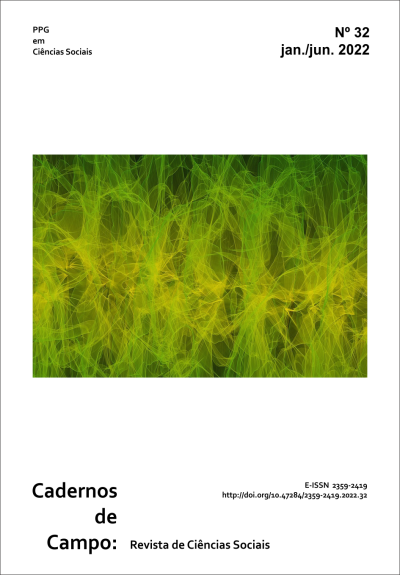The Crisis of Liberal Democracy and the Difficult Exit From the Left
An Analysis Based on the Struggle with the MTST-SP
DOI:
https://doi.org/10.47284/2359-2419.2022.32.279305Keywords:
Crise da democracia, conservadorismo popular, representação, movimentos sociais, MTSTAbstract
In different countries, reactionary leaderships have appeared as the only possible alternative to the crisis of liberal democracy. This work intends to contribute to the understanding of the limits of a radically democratic transformation strategy that counts on the adhesion of the poorest workers on the periphery of capitalism. This is done through an ethnographically inspired research with the MTST-SP, a strong social movement in popular mobilization for the struggle for social rights. However, the research described below reveals how, while destabilizing the establishment by organizing atomized workers, it is in accommodation with the political and economic system that the MTST can advance. The interpretation of this ambiguous relationship between the MTST and the establishment helps to understand the constraints of a political action based on the active participation of popular layers hostile to the conflict with established institutions and values.
Downloads
References
ABERS, R.; SERAFIM, L.; TATAGIBA, L. Repertórios de interação estado-sociedade em um estado heterogêneo: a experiência na Era Lula. Dados, Rio de Janeiro, v.57, n.2, p.325-357, 2014.
BECK, U. Sociedade de risco: rumo a uma outra comunidade. São Paulo: Editora 34, 2010.
BOULOS, G. Estudo sobre a variação de sintomas depressivos relacionada à participação coletiva em ocupações de sem-teto em São Paulo. 2017. 124f. Orientador: Francisco Lotufo Neto. Dissertação (Mestrado em Psiquiatria) - Faculdade de Medicina, Universidade de São Paulo, São Paulo, 2017.
BOURDIEU, P. Sur l’Etat: cours au Collège de France 1989-1992. Paris: Seuil, 2012.
CASTORIADIS, C. Le monde morcelé. Paris: Seuil, 1990.
CHATTERJEE, P. The politics of the governed: reflections on popular politics in most of the world. New York: Columbia University Press, 2004.
CROUCH, C. Coping with post-democracy. London: Fabian Society, 2000.
DARDOT, P.; LAVAL, C. A nova razão do mundo: ensaio sobre a sociedade neoliberal. São Paulo: Boitempo, 2016.
DUBET, F. O tempo das paixões tristes. São Paulo: Vestígio, 2020.
EATWELL, R.; GOODWIN, M. Nacional-populismo: a revolta contra a democracia liberal. Rio de Janeiro: Record, 2020.
FELTRAN, G. Fronteiras de tensão: política e violência nas periferias de São Paulo. São Paulo: Ed. da Unesp, 2011.
FIERRO, A. Revolutionary Politics of Social Rights?: An Ethnographic Account of the Homeless Workers’ Movement in São Paulo. Milleniun, London, v.47, n.3, p.398-416, 2019.
FRANK, T. Pourquoi les pauvres votent à droite. Marselha: Agone, 2007.
FRASER, N. O velho está morrendo e o novo não pode nascer. São Paulo: Autonomia Literária, 2020.
GAGO, V. A razão neoliberal: economias barrocas e pragmática popular. São Paulo: Elefante, 2018.
GRAEBER, D. Um projeto de democracia. São Paulo: Paz e Terra, 2015.
GUILLUY, C. La France périphérique: Comment on a sacrifié les classes populaires. Paris: Flammarion, 2014.
HARAWAY, D. Situated knowledges: the Science question in feminism and the privilegie of partial perspective. Feminist Studies, Maryland, v.14, n.3, p.575-599, 1988.
HARDT, M.; NEGRI, A. Bem-Estar Comum. Rio de Janeiro: Record, 2016.
KECK, M. A lógica da diferença: o partido dos trabalhadores na construção da democracia brasileira. São Paulo: Ática, 1991.
LACLAU, E. A Razão Populista. São Paulo: Três Estrelas, 2013.
LILLA, M. A mente naufragada: sobre o espírito reacionário. Rio de Janeiro: Record, 2018.
MANIN, B. The principles of representative government. Cambridge: Cambridge University Press, 1997.
MARIANO, R. Neopentecostais: sociologia do novo pentecostalismo no Brasil. São Paulo: Edições Loyola, 2014.
MOUFFE, C. Sobre o político. São Paulo: Martins Fontes, 2015.
PIKETTY, T. Capital et idéologie. Paris: Seuil, 2019.
PITKIN, H. The concept of representation. Berkeley: University of California Press, 1984.
PLOTKE, D. Representation is democracy. Constellations, Berlim, v.4, n.1, p.19-34, 1997.
POLLETTA, F. “It Was Like a Fever…” Narrative and Identity in Social Protest. Social Problems, Oxford, v.45, n.2, p.137-159, 1998.
RUNCIMAN, D. How democracy ends. London: Profile Books, 2019.
SINGER, A. O lulismo em crise. São Paulo: Companhia das Letras, 2018.
SINGER, A. Os sentidos do lulismo. São Paulo: Companhia das Letras, 2012.
SINGER, P. Dominação e desigualdade: Estrutura de classes e repartição de renda no Brasil. Rio de Janeiro: Paz e Terra, 1981.
STREECK, W. How will capitalism end?. London: Verso, 2017.
Downloads
Published
Issue
Section
License
Copyright (c) 2022 Cadernos de Campo: Revista de Ciências Sociais

This work is licensed under a Creative Commons Attribution 4.0 International License.









